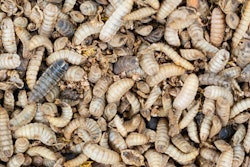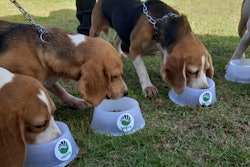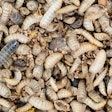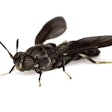
Most people eat insects daily. That was the big secret Anne Carlson, founder of insect-based pet food company Jiminy’s, had to share with her audience at Petfood Forum 2024 in Kansas City, Missouri on April 30. Although largely invisible, arthropods make their way into people’s meals as minced millipedes or ground grasshoppers in foods ranging from peanut butter to spinach.
While some might feel squeamish upon hearing of insects milled into their own diets, dogs and cats have no such scruples. Carlson discussed research on feral dogs and cats. Scientists observed the mammals specifically hunting bugs, not just eating insects incidentally while feasting on carrion.
Those packs of wild dogs might be onto something. Insects provide more than essential nutrition through their proteins and oils. Black soldier fly larvae, crickets, mealworms and other species benefit pets' health in various ways.
1. Gut microbiome
“The insect protein has chitin, which delivers fiber,” Carlson said. “The fiber feeds the good bacteria in the dog's gut…So it's prebiotic, but there's a little bit more here. It inhibits the growth of Clostridium perfringens, which generally causes when a dog has terrible, loose stool.”
2. Allergy relief
Insects qualify as a novel protein since they remain uncommon in dog and cat foods, she said. For dogs with food allergies, insect protein may provide nutrition without triggering an immune response since the pets haven’t been exposed to insect-based ingredients before.
3. Immune response
“The insects, if you look at them in the wild, they're living in really inhospitable places,” she said. “You see them in manure piles, on rotting corpses, things like that. As such, they have developed an incredible immune system. They're one of the richest sources of antimicrobial peptides. These microbial peptides play a critical role in immunity. When the dog eats the food that has the black soldier fly larvae in it, they're getting those…The peptides are heat resistant. You're able to cook it into a food, and it retains the properties."
4. Arthritis and joint health
Black soldier fly larvae can help with joint health in several ways, Carlson said.
“It is a natural source of glucosamine,” she said. “It also helps donate hydrogen atoms to unstable molecules, so it's helping the red blood cells.
5. Breath, teeth and gums
Black soldier fly larvae contain medium-chain fatty acids, which may inhibit those oral bacteria that lead to plaque formation and periodontal disease. The larvae are also high in calcium for building strong teeth.
“Insect protein suppresses the growth of bad bacteria in the dog's mouth, increases the good bacteria in the dog's mouth, and improves breath odor,” she said.
6. Weight management
“Insect protein looks like we're going to have some really exciting opportunities here,” she said. “The structure of the chitin is such that it appears that it will adhere to lipids and take lipids out of the body.”
Insect-based ingredients contain medium-chain triglycerides, which may improve the metabolic state of obese pets by modifying their intestinal health or directly influencing lipid metabolism.
7. Brain health
Among the medium-chain fatty acids found in black soldier fly larvae, lauric acid may be particularly important for the brains of older dogs.
“Lauric acid has been proven to improve cognitive function in older dogs,” she said. “It provides the brain energy in the form of ketones.”
 Created by Tim Wall using DALL-E 3
Created by Tim Wall using DALL-E 3
















